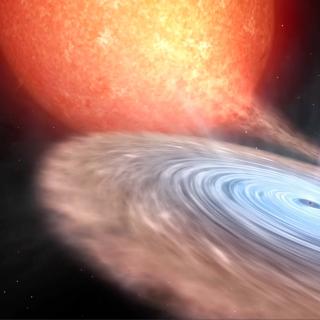Bibcode
Hardy, L. K.; Dhillon, V. S.; Spitler, L. G.; Littlefair, S. P.; Ashley, R. P.; De Cia, A.; Green, M. J.; Jaroenjittichai, P.; Keane, E. F.; Kerry, P.; Kramer, M.; Malesani, D.; Marsh, T. R.; Parsons, S. G.; Possenti, A.; Rattanasoon, S.; Sahman, D. I.
Referencia bibliográfica
Monthly Notices of the Royal Astronomical Society, Volume 472, Issue 3, p.2800-2807
Fecha de publicación:
12
2017
Número de citas
91
Número de citas referidas
76
Descripción
We present a search for optical bursts from the repeating fast radio
burst FRB 121102 using simultaneous observations with the high-speed
optical camera ULTRASPEC on the 2.4-m Thai National Telescope and radio
observations with the 100-m Effelsberg Radio Telescope. A total of 13
radio bursts were detected, but we found no evidence for corresponding
optical bursts in our 70.7-ms frames. The 5σ upper limit to the
optical flux density during our observations is 0.33 mJy at 767 nm. This
gives an upper limit for the optical burst fluence of 0.046 Jy ms, which
constrains the broad-band spectral index of the burst emission to
α ≤ -0.2. Two of the radio pulses are separated by just 34 ms,
which may represent an upper limit on a possible underlying periodicity
(a rotation period typical of pulsars), or these pulses may have come
from a single emission window that is a small fraction of a possible
period.
Proyectos relacionados

Agujeros negros, estrellas de neutrones, enanas blancas y su entorno local
Los agujeros negros y estrellas de neutrones en binarias de rayos-X son laboratorios únicos para explorar la física de estos objetos compactos. No solo permiten confirmar la existencia de agujeros negros de origen estelar a través de mediciones dinámicas de sus masas, sino que también permiten investigar el comportamiento de la materia y la
Montserrat
Armas Padilla